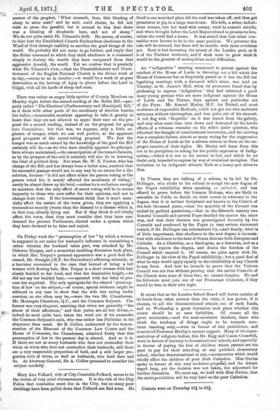There was rather an angry little sputter of County Members
on Monday night before the second reading of the Ballot Bill,—pro- perly called " The Elections' (Parliamentary and ,Municipal) Bill," as it deals with other parts of the machinery of election besides the ballot,—honourable members appearing to take it greatly to -heart that they are not allowed to argue their case on the pro- posal for a second reading, instead of on the proposal for going into Committee ; but that was, we suppose, only a little ex- plosion of temper, which we can well pardon, at the apparent _good prospects of the secret-voting proposal. We fear the temper was as much caused by the knowledge of the good the Bill certainly will do,—as we who have steadily opposed its principle have always maintained,—the emancipation of the tenant-farmers, as by the prospect of the evil it certainly will also do in lowering the ideal of political duty. But when Mr. W. E. Forster, who has -charge of the Bill, and has always been a ballot man, asserted that its successful passage would not in any way be an excuse for a dis- solution, because "it did not affect either the person voting or the person voted for, it merely affected the machinery of voting," -surely he almost threw up his brief,—unless he is audacious enough to maintain that the only effect of secret voting will be to secure impunity to those who now suffer for their opinions, and not to ,change their vote. If the Government think that it won't mate. -nay affect the nature of the votes given, they are applying a -tremendous remedy (worse than the disease) to a disease which is, in that case, already dying out. But if they think it will vitally -affect the votes, then they must consider that they have con- -demned the present Parliament, elected under a system which they have declared to be false and unjust.


































 Previous page
Previous page